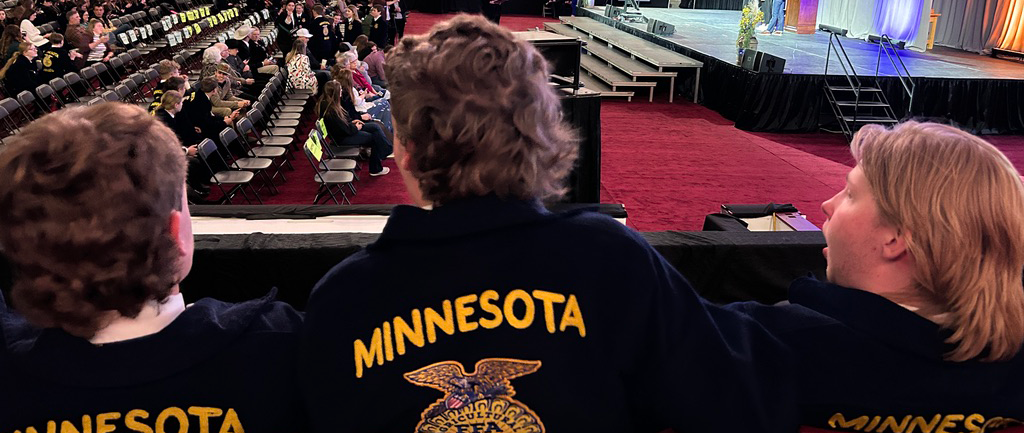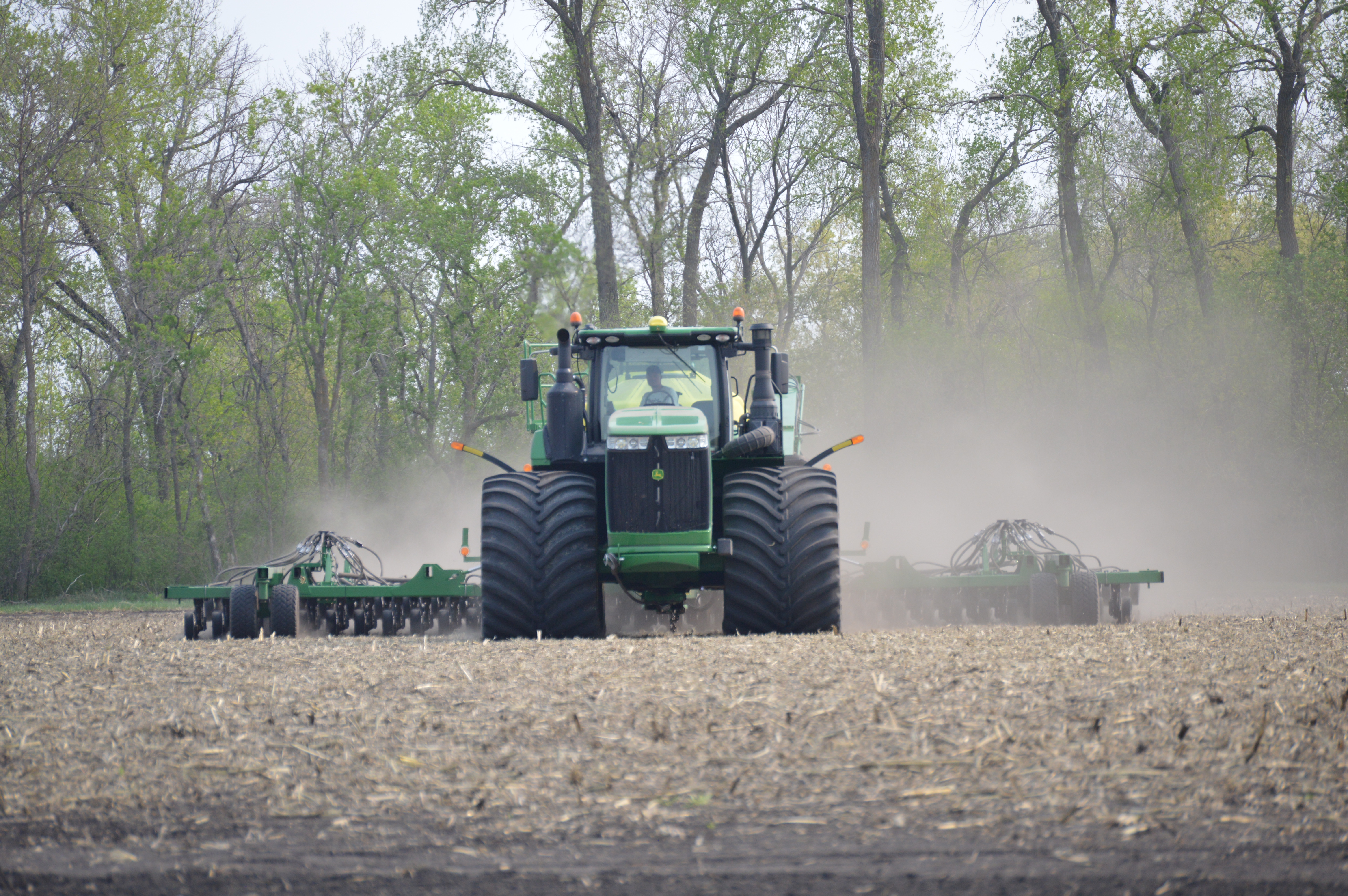In the face of a prolonged trade war with China, Minnesota Soybean accentuated the positive and looked on the bright side at Farmfest 2019 this week in Morgan, Minn.
During three sun-soaked days, the Minnesota Soybean Research & Promotion Council (MSR&PC) took new routes by highlighting the latest developments in soybean research and uses to attendees throughout the three-day event.
“The direction this organization moves only goes one way: forward,” said MSR&PC CEO Tom Slunecka. “We know agriculture is hurting right now, but it’s our job to continue to increase the profitability of our farmers. Farmfest gives us the opportunity to hear their concerns, and to let them know how the programs and projects we’re working on will improve their bottom line.”
The Council laid out RePLAY road sealant, which is 88 percent biobased, discussed advancements in soybean breeding, touted the Soy Innovation Campus and showed off a “Cummins Commando” Jeepster that runs on B20 (20 percent biodiesel).
“We work tirelessly to maximize checkoff investments,” said MSR&PC Chair Cole Trebesch, who farms in nearby Springfield. “Every year, it’s important to underscore the value of checkoff-funded research, and hopefully we accomplished that. I mean, we’re literally standing on soy-based asphalt.”

Meanwhile, the Minnesota Soybean Growers Association (MSGA) welcomed an array of legislators and agriculture officials into their booth, including USDA Secretary Sonny Perdue, Gov. Tim Walz and U.S. House Ag Chair Collin Peterson. MSGA directors also met with Rep. Angie Craig and explained to the congresswoman, who also serves on the House Ag Committee, the benefits of the Soy Innovation Campus in Crookston.
“Farmers in my region will see a huge benefit to the Soy Innovation Campus,” says MSGA Vice President and Polk County farmer Mike Skaug. “This year’s Farmfest has been a unique opportunity to have one-on-one contact with federal legislators and have conversations on how we’re working to improve the outlook for Minnesota farmers.”
Rep. Craig, who’s in her first year in Congress, says she was encouraged by what she learned about soybean uses following a discussion with MSR&PC CEO Tom Slunecka.
“This is incredibly exciting. We need to think about the next generation of farmers, and that’s what Minnesota Soybean is doing,” Rep. Craig said.
Farmer leaders also advocated for more access to foreign markets, a resolution to the tariff dispute with China, more rural mental health and broadband resources at the federal level and protecting the Renewable Fuel Standard.
“We had a lot of fruitful conversations with both state and federal officials and were able to discuss our priorities and concerns,” says MSGA President Jamie Beyer. “Hopefully those messages reach both Congress and the Trump administration.”
Trade winds
On Tuesday, leaders from across the agricultural sector gathered in the Wick Building to discuss national agricultural policy issues. The hottest topic at the table during Tuesday’s roundtable was, of course, trade.
“The trade war has become the perfect storm and farmers have to have those hard conversations,” said Scott VanderWal, vice president of the American Farm Bureau Federation. “The administration needs to get back to the table with China and needs to pass the United States Mexico Canada Agreement.”

With the recent reports that China has halted all U.S. agricultural imports, American Soybean Association Director Joel Schreurs says the uncertainty is adding to the stress farmers continue to face every day. Schreurs then made a passionate plea to both the audience and the panel.
“We need these subsidies to stay afloat because you can’t expect to produce at a loss and stay in business, that is not how it works,” said Schreurs, a Tyler farmer. “This is has created a mental health crisis not knowing what is next. If you are having negative thoughts, please talk to someone.”
Schreurs also participated in a standing-room only House Ag Committee listening session, and directly addressed Sec. Perdue on the Trump administration’s strategy to deal with China.
“How are you going to keep the farmers farming?” Schreurs asked. “The exports just aren’t going to be there. We’ve worked a long time to develop these markets, and we’re going to lose this market share. It’s just not going to come back in a day or two. So how do we make this work?”
The secretary assured Scheurs he was optimistic the China market would come back, along with more soybean purchases from other emerging countries. The secretary suggested the soybean industry has been too reliant on trade with China. Prior to the trade war, about one in three rows of soybeans in Minnesota was shipped to China. In 2017, the U.S. shipped more than $14 billion in soybeans to China; in 2018, the total decreased by about 75 percent.
“The markets are fungible. China is going to buy from where they see the best value,” he said.
Rep. Craig, who represents farm country south of the St. Paul, said she sees “a lot of pain” in her district as a result of the yearlong trade war.
“I don’t see a strategy in sight from the administration,” she said, turning to Sec. Perdue. “Mr. Secretary, I’m rooting for you, but I’m not sure how much longer our farmers can wait.”
All in the family
On Thursday afternoon, two MSGA leaders were named the University of Minnesota’s “Farm Family of the Year” for their respective counties. Brad Hovel, operator of Hovel Farms, earned farm family honors for Goodhue County, while American Soybean Association Vice President Bill Gordon and his wife, Dawn, were chose as Nobles County’s Farm Family of the Year.







